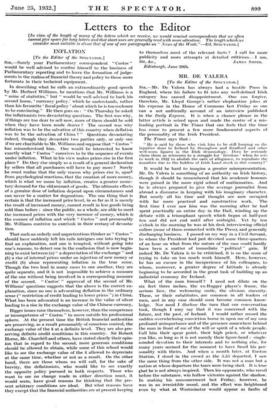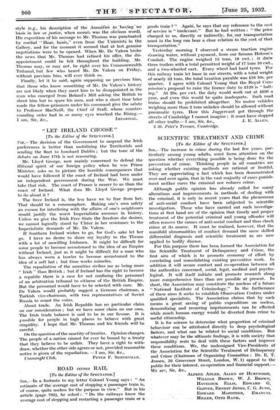MR. DE VALERA
[To the Editor of the SPECTATOR.] Si,—Mr. De Valera has always had a hostile Press in England, where his failure to fit into any well-defined Irish category has caused disappointment. One can forgive, therefore, Mr. Lloyd George's rather elephantine jokes at his expense in the House of Commons last Friday as one -can a not unfriendly account of an interview published in- the Daily Express. lt is when a chance phrase in the latter article is seized upon and made the centre of a mis- leading portrait in The Times that one feels that the time has come to present a few more fundamental aspects of the personality of the Irish President.
The Times says that : He is said by those who visit him to be still harping on the injustice done to Ireland by Strongbow and Strafford and other well-worn figures in the Irish demonology. Does he seriously claim them as witnesses to a struggle for ' freedom ' when he sets to work in 1932 to abolish the oath of allegiance, to repudiate the annuities duo to the holders of Irish Land stock in this country?"
It would be hard to imagine a greater misrepresentation. Mr. De Valera is something of an authority on Irish history, though it should be remembered that his academic honours were gained in the more rigid school of mathematics. And he is always prepared to give the average journalist from abroad a discourse in keeping with his imaginary character. But nearly all his time and thought are now occupied with far more practical and constructive work. The first time I ever saw him was the morning after he had spent practically an entire day in the Dail, winding up the debate with a triumphant speech which began at half-past ten and did not end until after midnight. Yet by ten o'clock in the morning he was at his desk interviewing official callers (none of them connected with the Press), and generally discharging business. I passed on my way in a Civil Servant, to whom the President had just devoted some three-quarters of an hour on what from the nature of the case could hardly have been a matter of immediate " political " gain. If indeed Mr. De Valera is to be criticized, it is on the score of trying to take on too much work himself. Here, however, he has an excuse in the inexperience of his colleagues, to whom, moreover, a greater degree of latitude is already beginning to be accorded in the great task of building up an industrial economy for Ireland.
What of the man himself ? I need not dilate on the six feet three inches, the ex-Rugger player's frame, the serious face, the welcoming smile, the obvious sincerity. These, or their substitutes, are common in all leaders of men, and in any case should soon become common know- ledge. Nor need I disclose the turn that our conversation took, though I may say that it was concerned with the future, not the past, of Ireland. I would rather record the sudden overwhelming conviction borne in upon me of my own profound unimportance and of the presence somewhere behind the man in front of me of the will or spirit of a whole people. Call him their spear point, their high priest, or whatever you like, so long as it is not merely their figure-head : single- minded devotion to their interests and to nothing else, for many years seemed for the moment to have fused his per- sonality with theirs. And when a month later, at Easton Station, I stood in the crowd as the 5.55 departed, I saw the same thing from the other side. It was not a man but a nation at whose departure the tears were being shed. It is true that he is not always inspired. Then his opponents, who recoil before the substance, win hollow victories-against the shadow. In making his announcement -last Friday, however, he was in an irresistible mood, and the effect was heightened even by what at Westminster would appear as faults of style (e.g., his description of the Annuities he:having 'no basis in law or justice, when morals was the obvious' word). His exposition of his message to Mr. Thomas was panctuated by cordial:" Hear, heare," even frond the 'UniOnisti in the Gallery, and for the moment it seemed that it last genuine negotiations were to be opened. When Mr. De Valera broke the news that Mr. Thomas had refused hit Offer, the dis- appointment could be felt threughout the building. Mr. Thomas may, or may not, be right over his Commonwealth Tribunal, but few who heard Mr. . De Valera on Friday, without previous bias, will ever think so.
Finally, let it be said, again supposing no previous bias, that those who know something of Mr. Be' Valera's history are not likely when they meet him to be disappointed in the man who emerged from Boland's Mill asking the British to shoot him but to spare his men, and who a short time later made the fellow-prisoners under his command give the salute to Professor MacNeill, the Chief of Staff, whose counter- manding order had in so many eyes wrecked the Rising.—



































 Previous page
Previous page